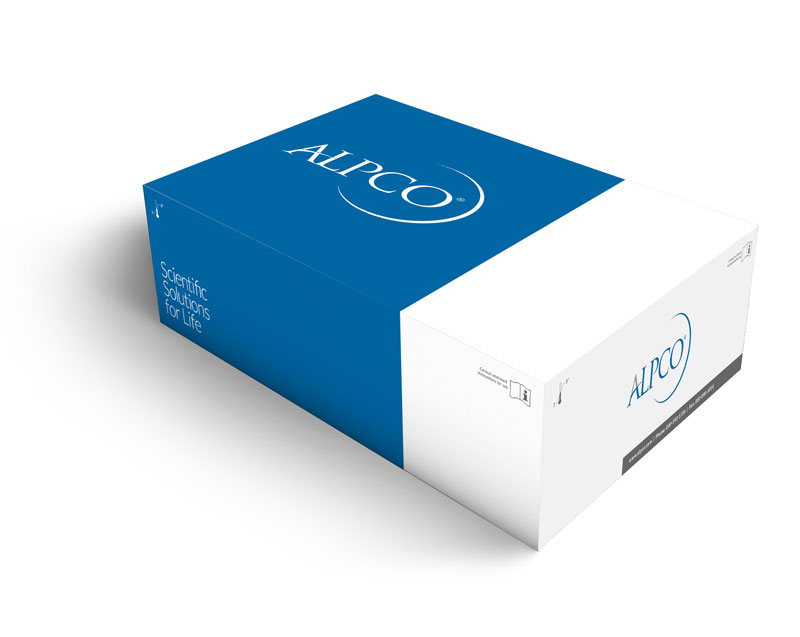Tips & Tricks
The Enzyme-Linked Immunosorbent Assay (ELISA) is a proven sensitive method for detecting and quantifying specific biomarkers in a wide range of clinical and research samples. The accuracy and precision of ELISAs can be affected by many factors, including pipetting, washing, and sample-handling techn...
FAQs
ImmunoassaysWhat kind of sample type can be used with the kit I purchased?Each type of kit has been validated for the sample types indicated in its protocol. All other sample types would have to be validated internally. Please contact ALPCO's product support team for further information regardi...
AACC 2023
Skip the crowd and reserve your time for a demonstration or individual meeting with a member of our team.Stop by Booth #2547
Ask About Our Targeted Solutions for Your GI Testing.Customized solutions for your calprotectin testing needs.GI SOLUTIONSEnsure AccuracyNew! Calprotectin Immunoturbidimetric...
ELISA Instrumentation
Automate
ELISA Testing to Improve Performance and Productivity Shifting from manual ELISA processing to automation helps reduce variability and improve analytical performance. ALPCO offers automation to optimize workflow, capacity, and productivity.DYNEX DS2® 2-Plate ELISA Processing SystemCompact....
How to Properly Collect and Handle GLP-1 Samples
We know that the proper collection and handling of samples is vital for accurately measuring GLP-1.
ALPCO is here to help your lab reduce technical errors and improve assay results when running the STELLUX® Chemi Active GLP-1 (7-36) amide ELISA.
Watch our video to learn how to properly collect...
12 ELISA Tips and Tricks: An Expert’s Guide to Improve Your Technique
The Enzyme-Linked Immunosorbent Assay (ELISA) is a proven sensitive method for detecting and quantifying specific biomarkers in a wide range of clinical and research samples. The accuracy and precision of ELISAs can be affected by many factors, including pipetting, washing, and sample-handling techn...
Managing Calprotectin as a Send Out?
While sending out for calprotectin testing offers some cost and convenience advantages when volumes are very low, bringing the process in-house allows for the opportunity to control costs, turnaround time, and quality. Considering costs and potential revenue, the volume at which in-house calprotecti...
The Significance of Bioactive Leptin in Obesity Research
May 3, 2016
Leptin resistance is a challenging topic of conversation in obesity. It is defined by a state in which the body does not display any adapted response to high endogenous or exogenous levels of leptin while continuing to maintain excess body weight1. This may be due to a decreased uptak...
Complement System TCC and C4d ELISAs Now Available
ALPCO is pleased to announce the availability of two new immunoassays to measure complement system activation, the Complement C4d ELISA and the Terminal Complement Complex (TCC) ELISA.The complement system plays an essential role in acute and chronic inflammation, in immune response to infection...
Webinar On Demand: Multiplex IgE Testing and Molecular Allergens
Our speaker from MacroArray Diagnostics, Christian Harwanegg, PhD, discusses Multiplex IgE Testing and Molecular Allergens.
Watch Now
The ALEX2 ALLERGY XPLORER multiplex IgE panel enables screening of up to 300 environmental and food allergens with just 100 – 200µL of sample. Testing a lar...
Product Data: Insulin Chemiluminescence ELISA
ALPCO’s Insulin Chemiluminescence ELISA detects insulin at levels as low as 20 pg/mL in human serum, plasma, and β-islet tissue culture supernatants, without cross-reactivity to human intact proinsulin, mouse insulin, or rat insulin.
How Can Your Lab Benefit from Immunoassay Automation?
The use of the Enzyme-Linked Immunosorbent Assay (ELISA) technique has assisted both clinical and research laboratories in quantifying analytes of interest in heterogeneous samples. The sensitivity and specificity achievable with immunoassays are often ideal for biomarker testing. However, manually ...
DYNEX DSX® 4-Plate ELISA Processing System
ALPCO is partnering with DYNEX to provide laboratories with a fully-automated ELISA system capable of processing four plates simultaneously. The DYNEX DSX® is designed to mimic ELISA accuracy without the hands-on labor, time, and cost previously required. Laboratories can take advantage of the ...
Now Available: 510(k) Cleared Fecal Calprotectin ELISA
ALPCO received 510(k) clearance from the US FDA for its new fecal Calprotectin Chemiluminescence ELISA test.
The ALPCO Calprotectin Chemiluminescence ELISA’s superior clinical accuracy will enable clinical laboratories to provide the most accurate results to gastroenterologists facing the cha...
6 Tips for Improving Chemiluminescence ELISA Precision
Chemiluminescence ELISA technology offers enhanced sensitivity with a very broad dynamic range. However, consistency in assay technique is especially important to ensure optimal performance from day-to-day and operator-to-operator. The following six tips may help to improve intra-assay and inter-ass...
Thunderbolt® Automated Color/Chemiluminescence ELISA System
ALPCO is now partnering with Gold Standard Diagnostics to provide laboratories with a fully automated benchtop system compatible with both colorimetric and chemiluminescence ELISAs. The Thunderbolt® System performs all operations, including pipetting, washing, and plate reading, for walk-away pr...
Customer Spotlight: Measuring Functionality of Islet Microtissues
Date: July 26, 2016
Beta cell generation has gained much traction in recent years among diabetes researchers. Investigators are not only converting adipose tissue and skin cells into beta cells, they are also starting to grow beta cells in a petri dish in vitro. Swiss company InSphero has begun m...
 Rat C-Peptide ELISA
Rat C-Peptide ELISA Mouse C-Peptide ELISA
Mouse C-Peptide ELISA cAMP ELISA
cAMP ELISA Ultrasensitive Insulin ELISA
Ultrasensitive Insulin ELISA Rat Insulin ELISA
Rat Insulin ELISA cAMP Complete ELISA
cAMP Complete ELISA PGF2a ELISA 5 Plate
PGF2a ELISA 5 Plate PGF2a ELISA
PGF2a ELISA Ultrasensitive Insulin ELISA Jumbo Pack (10 Plates)
Ultrasensitive Insulin ELISA Jumbo Pack (10 Plates) Mouse Insulin ELISA Jumbo Pack (10 Plates)
Mouse Insulin ELISA Jumbo Pack (10 Plates) Anti-HAV ELISA
Anti-HAV ELISA Mouse Insulin ELISA
Mouse Insulin ELISA